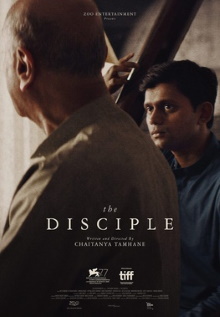Films that are centered around other artistic endeavors are tough to judge when we have no basis on which to decide whether how good that art is. This is doubly true here in a film about a very specific form of north Indian classical music. Even if it’s hard for us who don’t even understand how this form of music is supposed to work, the reverence that the film holds for the art form shines through. Yet what elevates this film to greatness is that this is not blind reverence but a powerful memoir of one man’s journey and how he matures past the teachings of his beloved guru.
Sharad Nerulkar is a diligent student of classical Indian music and devotes his life entirely towards honing his skills as a vocalist. He is attentive to the needs of his beloved guruji and listens to the recordings of the lectures of his guru’s own guru Maai to relax and immerse himself in the spiritual underpinnings of the music. Yet no matter how hard he tries and how much he trains, he is a competent musician but not a truly excellent one. He enters a public competition with high hopes but fails to even finish in the top three. When he joins his guru and two fellow students at a performance, his guru chides him for not paying proper attention to the music. Noticing his frustration, his guru tells him that Maai had them do nothing but practice until the age of 40. At the same time he is dismissive towards other musicians who sacrifice the purity of classical music in order to pander to popular tastes. This continues until Sharad himself nears the age of 40 and has students of his own, yet his mastery of the musical form still seems incomplete.
Many commentators have noted similarities between this and Inside Llewyn Davis as both are about musicians who keep trying but never quite make it big. This too is a very depressing film to watch as Sharad willingly gives up so much, including neglecting his own mother and putting any semblance of a personal life of his own on hold while doing his utmost to please his guruji. It’s a cliché that those who want to make great art must sacrifice money and personal comfort but the tradition that Sharad follows actually embraces it, teaching that such deprivation is practically a prerequisite for mastery. Sharad in turn transmits this condescension to his own students, rejecting any possibility of adapting the music for a more modern context or even allowing his students to learn his skills in conjunction with other forms of music. Director Chaitanya Tamhane surprises me by acknowledging that this blind adherence to tradition isn’t necessarily a good thing. When Sharad meets a music critic that he respects, he is shocked to hear harsh criticisms directed by his own guruji and Maai. He is forced to confront the ugly possibility that he may not be very talented but his guruji keeps him around simply he needs Shad to take care of him.
This isn’t a documentary so there’s no broad overview of this musical form on offer. Still, between the early lessons Sharad receives from his enthusiastic father, his lessons with his guruji and the recordings of Maai’s lectures, it is possible for us to glean some impressions of it. The singing itself seems simple but apparently spontaneity and properly feeling the moment is prized, which seems reminiscent to me of jazz. Certainly the minimalism of the form lends itself easily to spiritual contemplation and it’s no wonder why Sharad’s teachers insist that devotion is required to master the art. The quiet, slowed down moments when Shad travels around on his bike while contemplating the content of Maai’s lectures are excellent. They also serve as a great way to show the changes the city of Mumbai goes through as Sharad grows older. I also love how Indian classical music pops up in unexpected places all across the city as Sharad comes to accept that his teachers’ rigid adherence to tradition is perhaps outdated but that doesn’t mean the music itself isn’t of value.
I hesitate to give this film my highest recommendation as I am missing too much of the necessary background knowledge, not even being able to tell for example how the songs are different. But this is certainly a very strong film, albeit one that tonally feels closer to a Western film than an Indian one, perhaps due Alfonso Cuaron serving as a mentor. I note that director Tamhane’s first feature film was Court, which I have long wanted to see. It was hard to find for a while but now seems to be more widely available. I will certainly be looking forward to seeing it in the near future.

One thought on “The Disciple (2020)”